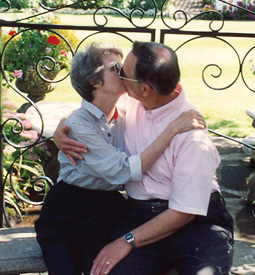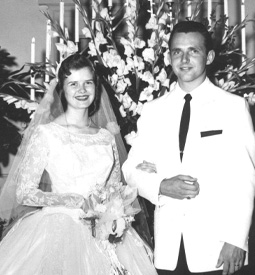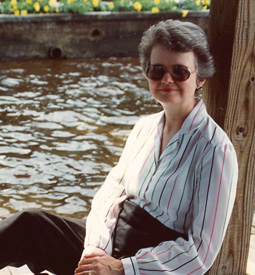A Legacy of Love: Woody Ogden Leaves Bequest to Fight Alzheimer’s Disease in Honor of His Wife Peggy
 |
To Woody Ogden, there was no one on earth as kind or gentle as his wife Peggy. The pair attended school together from kindergarten through high school graduation. In 1956, when they were barely out of high school, Peggy captured Woody’s heart and has held it firmly ever since.
At 16, Woody dated Peggy’s twin sister Jo. Despite their identical appearances, the sisters could not have been more different. Where Peggy was soft and nurturing, Jo was loud and commanding. When Woody and Jo broke up, he never intended to date her sister. But fate had other plans. At 19, the two started dating. At 20, Peggy and Ogden got married. Shortly after, they had a baby boy.
Peggy found her deepest joys in homemaking and caring for others. She took pride in the structure of her home, the health of her daylilies, and the happiness of her neighbors. She volunteered at her church. She brought meals to the sick.
And then, at only the age of 55, Alzheimer’s began to take Peggy’s mind.
The disease progressed in small, almost undetectable ways for years. Peggy kept a “meticulously clean” household, Woody recalls: the house was so tidy her friends nicknamed her “Mrs. Clean.” In 1989 Woody remembers seeing dust on the furniture for the first time in their marriage. The next year, Peggy stopped tending to her daylilies in her beloved garden.
“If I would’ve taken her to the doctor and said, ‘Hey, my wife’s not dusting anymore,’ they would’ve thought something was wrong with me,” Woody said with a chuckle.
When more serious symptoms arose, Woody and Peggy saw a neurologist. The CT scan confirmed his fears: Peggy had early-onset Alzheimer’s.
Woody stood by her side through the progression of the disease, quitting his job to become her full-time caretaker. As her sickness played out, she slept in a hospital bed only twice. Every night, she slept at Woody’s side—in her own bed, and in her own home. When she passed, Woody knew he wanted to use his hard-earned money to fight this horrible disease.
 |
“I didn't want my lifetime earnings to be spent away with no purpose,” he said. “The most useful purpose I could find on planet earth was to cure Alzheimer's disease.”
At first, Woody thought he’d make a bequest to one of the largest hospitals in the United States, but his financial advisor thought better. He told Woody to find an institution that is making a large impact on Alzheimer’s research—one where his lifetime earnings will do substantial good for the community instead of being lost among other endowments.
Woody began researching hospitals below the Mason-Dixon Line and east of the Mississippi River, wanting his gift to make the biggest impact in the region where he and Peggy made a life together. Although the Ogdens never stepped foot on campus, his research brought him to The University of Alabama at Birmingham—where he decided to leave a bequest in his will to fight Alzheimer’s disease.
Woody made a good choice. David Geldmacher, M.D., who serves as the division director for memory disorders, said gifts like Woody’s allow UAB to attract senior scientists who are accomplished in their field and apply their expertise to serve our community.
“We've been involved in the development of the new medicines that are now available for prescription use in Alzheimer's disease,” Geldmacher said. “They are the first medicines that have reached the marketplace that actually remove Alzheimer’s pathology from the brain and, in doing that, reduce the progression of the disease.”
This development is paramount to the progression of AD research, but UAB’s Brain Aging and Memory Clinic is not stopping there. Geldmacher said their research team is now studying one of those same medications to see if it can prevent AD from developing. This kind of innovative research is exactly what motivated Woody Ogden to give.
“I watched Alzheimer’s gradually taking my wife away from me, and all I wanted was for somebody to come up with a cure for it,” Woody said, “or prevent it, most of all.”
In addition to helping advance potential breakthroughs, Woody’s decision to support UAB is particularly impactful because people born in the Deep South have a 20% to 30% higher risk of developing Alzheimer’s than in other regions of the country.
 |
Peggy was attentive and nurturing. As her best friend, Marsha Birdsong, shared in her eulogy, “Peggy was totally unselfish. She would share anything she had with you. She gave of herself to her church. She gave to her family and to her friends. There were times when I'd ask her why she was doing such and such thing for a person. Hadn't she done enough already for them? And do they do the same for you? She'd look at me and say, ‘Marsha, I just can't not help them!’ ”
Woody’s planned gift to UAB ensures that Peggy’s legacy of generosity will live on and continue to make a difference for years to come. Like the Ogdens, you, too, can make a difference in the areas closest to your heart. For information on the planned giving options available, contact the Office of Planned Giving at (205) 996-7533 or plannedgiving@uab.edu today.
© Pentera, Inc. Planned giving content. All rights reserved.
Disclaimer
